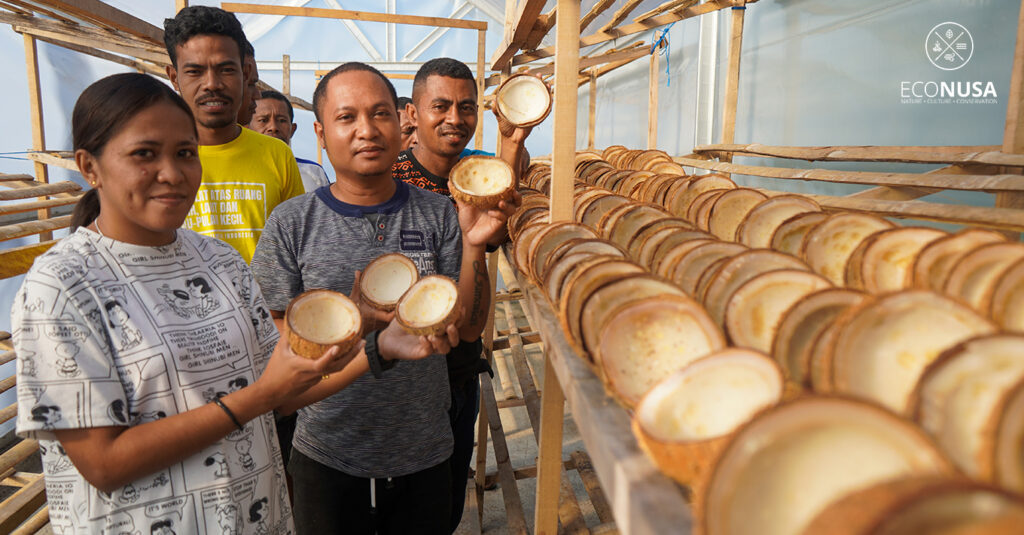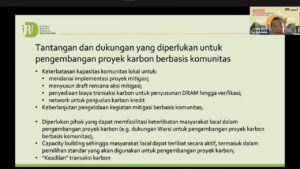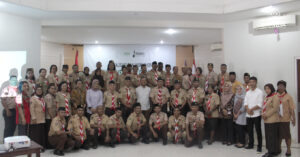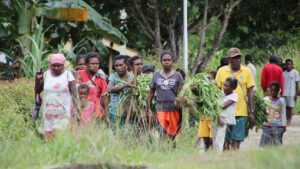
Two young men arranged the chopped coconut on the wooden shelf in a multipurpose ultraviolet dryer doom nearby beach at Kamal Village, Seram Bagian Barat Regency, Maluku. The time was only at 08.15 Eastern Indonesia Time, but the heat on the dryer doom reddened their faces. “This is our daily activity, ensuring the safety of dryer doom,” said Marlens Monaten, one of the youngsters, on Saturday, 21 May 2022.
Marlens, 19, is a senior high school graduate. His peer, Jepson Monaten, 24, is an elementary school graduate. Having graduated their educations, both of them has never got a formal job. “We just do nothing every day due to the absence of activity,” said Marlens.
Read also: Elementary School Graduate Initiating Village Independence
In March 2021, Eko Susanto called them to work. At the time, Eko had just completed a training from Saka Mese Nusa Social Transformation School (STS) in Morekau Village, Seram Bagian Barat, on 8-25 February 2021 initiated by EcoNusa. There were three classes on the training, namely, organic farming, multipurpose drying, and biogas classes. Eko participated in the organic farming.
Going back to Kamal Village, Eko asked the local jobless youngsters to try doing an organic farming. As to Eko, there were many young people in his village who are unemployed. Getting drunk and being troublemakers are their common daily routines. “I asked them patiently and talked to them many times,” said Eko.
In one of his attempts, he called them to count their spending for cigarettes in a year. They spend at average Rp 10,000 a day for cigarette. In one year, each of them could spend more than Rp3.5 million excluding the other expenses. “Whereas, they have no income,” said Eko.
Read also: STS Morekau Closing, Sharing Session for Village Development
There were 12 unemployed young peoples who eventually expressed their interests. Eko transferred his knowledge from STS such as choosing seeds, creating plot, planting technique, and making fertilizer.
By borrowing farming tools from neighbors, they planted water spinach, long bean, peanuts, chilly, and bean. They sold the crops to the neighborhood. Some others were given to the young people for their domestic consumption. The money generated from farming was used to afford seeds and the required farming tools.
From last October, Eko tried white copra business. He got loan to build a multipurpose dryer doom. Eko made it from a UV plastic. He afforded coconuts from local farmers to processed into copra.
Read also: STS Just a Start
Time went by when some youngsters left their jobs one by one. Some preferred to get a job at downtown and some others walked out in pursuit of doing fun. Now, there are six youngsters left who are dedicated to the activity. Eko took them into copra production here.
So far, Marlens has yet to get benefit from selling organic farming and copra. However, he was satisfied as he could study organic farming and copra drying. The most important is that he has something to do now. “Hopefully I could make my own garden and dryer doom,” he said.
In response, A. Noya, the acting Head of Kamal Village, gave his backup to Eko’s attempt to get the local youngsters involved. As to him, there are many jobless people in the village. Sometimes they become troublemakers in the village. “Let us build our village for the future,” he said.
Read also: Mogatemin STS Participant Pledges to Manage Local Shrimp Potential
Not only taking young people in, Eko also motivated women in the local Neighborhood Unit (RT) in his village to do domestic farming. A local villager lent an idle land to be utilized there.
Eko coached them to cultivate land and make organic fertilizer from the existing materials from their neighborhood such as coconut water, banana, fish, and rice washing water. “We have never known (about organic fertilizer), but when we worked with Mr. Eko, we came to know about it. The vegetables are more fertile,” said Yulia Somae, the coordinator of neighborhood.
The local women planted peanuts, water spinach, and bean. They sold their crops to the surrounding neighbors and for domestic consumption. It saved the women’s domestic spending. “We usually spend Rp5,000 a day for vegetables, but when we have crops, we do not buy them,” said Carolina Upuyi, another local woman.
Editor: Leo Wahyudi, Carmelita Mamoto, Lutfy Putra




